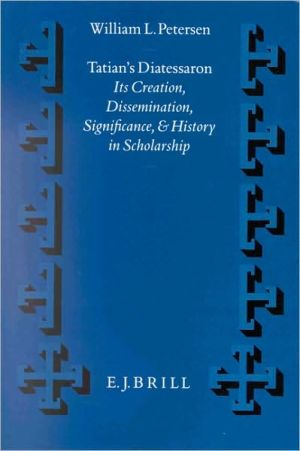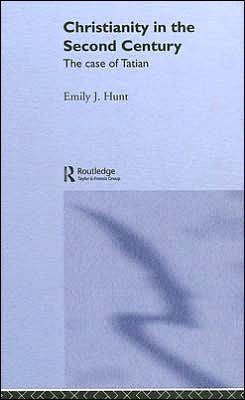Christianity in the Second Century: The Case of Tatian
Search in google:
Tatian is a significant figure in the early Church, his work both representing and revealing his second century context. This study offers a detailed exploration of his thought. It is also a valuable introduction to the entire period, particularly the key developments it witnessed in Christianity. Emily Hunt examines a wide range of topics in depth: Tatian's relationship with Justin Martyr and his Oration to the Greeks; the Apologetic attempt to defend and define Christianity against the Graeco-Roman world, and Christian use of hellenistic philosophy. Tatian was accused of heresy after his death, and this work sees him at the heart of the orthodox/ heterodox debate. His links with the East, and his Gospel harmony the Diatessaron, lead to an exploration of Syriac Christianity and asceticism.In the process, scholarly assumptions about heresiology and the Apologists' relationship with hellenistic philosophy are questioned, and the development of a Christian philosophical tradition is traced from Philo, through Justin Martyr, to Tatian - and then within several key Syriac writers. This is the first dedicated study of Tatian for more than 40 years.
IntroductionChapter 1: Christianity in the Second Century1.1 Christianity and Judaism1.2 Christianity and the Hellenistic World1.3 Orthodoxy and Heresy1.4 Tatian and His Oration to the GreeksChapter 2: Tatian and Gnosticism2.1 The Work of Grant2.2 Tatian, the Valentinians, and Their Use of Paul2.3 Non-Gnostic Elements in Tatian's Thought2.4 Conclusion: Tatian, not GnosticChapter 3: Tatian and Justin Martyr3.1 Use of Christian Writings3.2 A Comparison Between Justin and the Oration3.3 Conclusion: The Extent of Justin's Influence Upon TatianChapter 4: Tatian and Hellenistic Philosophy4.1 Hellenistic Philosophy in the Second Century4.2 Tatian's Relationship With Hellenistic Philosophy4.2.1 Tatian's Apparent Hostility Towards Hellenistic Philosophy4.2.2 Tatian's Understanding of Christianity as a 'Philosophy'4.2.3 Tatian's Use of Hellenistic Philosophy4.2.4 Conclusion: Tatian's Relationship with Hellenistic PhilosophyChapter 5: Tatian and the Development of a Christian Philosophy5.1 Philo: Precursor of Christian Philosophy5.2 Justin: The Beginnings of Christian Philosophy5.2.1 The Debate About Justin's Relationship With Philo5.2.2 The Philosophical Tradition in Philo and Justin5.3 Tatian's Philosophy5.4 Conclusion: Tatian and the Development of a Christian PhilosophyChapter 6: Tatian and Syriac Christianity6.1 Tatian's Ties With Syriac Christianity6.2 Tatian and Encratism6.3 Tatian and the Syriac Texts6.3.1 The Acts of Thomas6.3.2 The Odes of Solomon6.3.3 Bardaisan6.3.4 Ephrem6.3.5 Aphrahat6.4 Conclusion: Tatian's Legacyto Syriac ChristianityConclusion: Tatian and Second Century ChristianityAppendix: Tatian and Clement's Accusation in Stromateis III.82.2Bibliography


